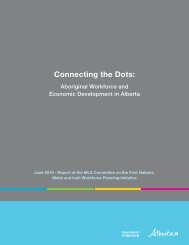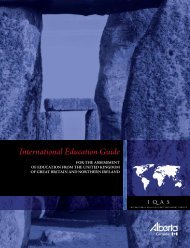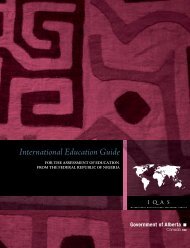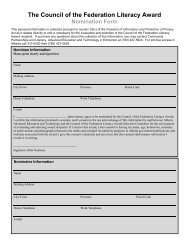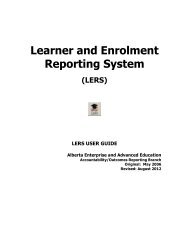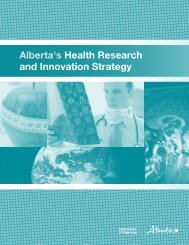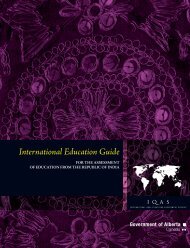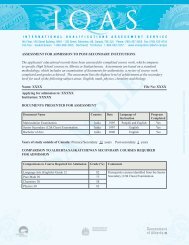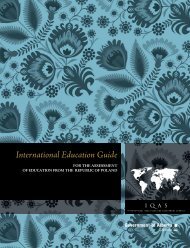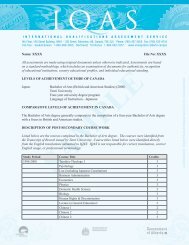International Education Guide - Enterprise and Advanced Education ...
International Education Guide - Enterprise and Advanced Education ...
International Education Guide - Enterprise and Advanced Education ...
You also want an ePaper? Increase the reach of your titles
YUMPU automatically turns print PDFs into web optimized ePapers that Google loves.
.44<br />
INTERNATIONAL EDUCATION GUIDE for the assessment of education from the Islamic Republic of Pakistan<br />
The provincial Pharmacy Councils register pharmacists<br />
<strong>and</strong> issue certificates of registration. They hold qualifying<br />
examinations for the registration of pharmacists twice every<br />
year. To sit the qualifying examination, one must have an<br />
HSC or equivalent <strong>and</strong> at least two years’ experience as an<br />
apprentice in pharmacy.<br />
The first degree in pharmacy used to be the four-year<br />
Bachelor of Pharmacy (BPharm). In 2004 the Higher<br />
<strong>Education</strong> Commission upgraded the program to a fiveyear<br />
Doctor of Pharmacy (PharmD). Entry is based<br />
on possession of the HSC in the required course group<br />
(pre-medical) with minimum marks. Students must pass<br />
annual university examinations, generally known as the<br />
First Professional, Second Professional, Third Professional,<br />
Fourth Professional <strong>and</strong> Final Professional. For programs<br />
that adopt the semester credit system, the HEC model<br />
curriculum prescribes a total of 192 credits. The HEC<br />
curriculum also lists the “deficiency courses” that BPharm<br />
graduates must take in order to upgrade to the new<br />
PharmD. Some universities offer a one-year course by which<br />
BPharm holders can upgrade to the PharmD.<br />
The MPhil in pharmacy is a two-year course following<br />
completion of either the BPharm or the PharmD.<br />
This includes one year of coursework <strong>and</strong> one year of<br />
thesis research. The degree is named after the area of<br />
specialization, such as MPhil Pharmacology, MPhil<br />
Pharmaceutics, MPhil Pharmaceutical Chemistry or MPhil<br />
Pharmacognosy. Holders of the MPhil following PharmD<br />
may pursue PhD study in pharmacy.<br />
Refer to Appendix N for a sample PharmD program<br />
structure.<br />
Veterinary Medicine<br />
Traditionally, three main types of programs for veterinary<br />
medicine <strong>and</strong> animal husb<strong>and</strong>ry were available:<br />
• the four-year Bachelor of Science (Honours) in<br />
Animal Husb<strong>and</strong>ry (BSc AH)<br />
• the four-year Bachelor of Veterinary Science (BVSc)<br />
• the four-year Doctor of Veterinary Medicine (DVM)<br />
The PVMC St<strong>and</strong>ards of <strong>Education</strong> Regulations of 2001<br />
prescribe the curriculum <strong>and</strong> syllabi for the five-year<br />
composite DVM degree covering both veterinary medicine<br />
<strong>and</strong> animal husb<strong>and</strong>ry. The five-year degree began to be<br />
offered in 2002. The previous separate degrees in veterinary<br />
medicine <strong>and</strong> animal husb<strong>and</strong>ry are being phased out.<br />
According to PVMC regulations, the main features of the<br />
five-year DVM degree are:<br />
• Entry is based on possession of the HSC or<br />
Intermediate Certificate with physics, chemistry,<br />
biology <strong>and</strong> English, or equivalent.<br />
• Duration of study is five years (ten semesters), including<br />
a compulsory six-month internship (10 semesters + one<br />
summer session).<br />
• Course of study includes training in a teaching<br />
veterinary hospital <strong>and</strong> livestock farm, <strong>and</strong> field<br />
training in veterinary production <strong>and</strong> technology<br />
institutions.<br />
• University examinations are held at the end of each<br />
year.<br />
• The university issues a provisional course completion<br />
certificate to students who pass the final examination<br />
<strong>and</strong> awards the degree after they complete the<br />
compulsory internship.<br />
Students who receive their four-year BSc AH after 2001<br />
are no longer eligible to work as veterinary officers in public<br />
<strong>and</strong> private sectors, nor will they be licensed to practice<br />
as veterinarians, unless they take the one-year deficiency<br />
DVM course.<br />
See Appendix O for sample program structures for the<br />
five-year DVM <strong>and</strong> the one-year deficiency course leading<br />
to DVM.<br />
Entry was based on possession of the HSC in the relevant<br />
course group (pre-medical). When the Pakistan Veterinary<br />
Medical Council was constituted in 1996, it recognized all<br />
those degrees.




